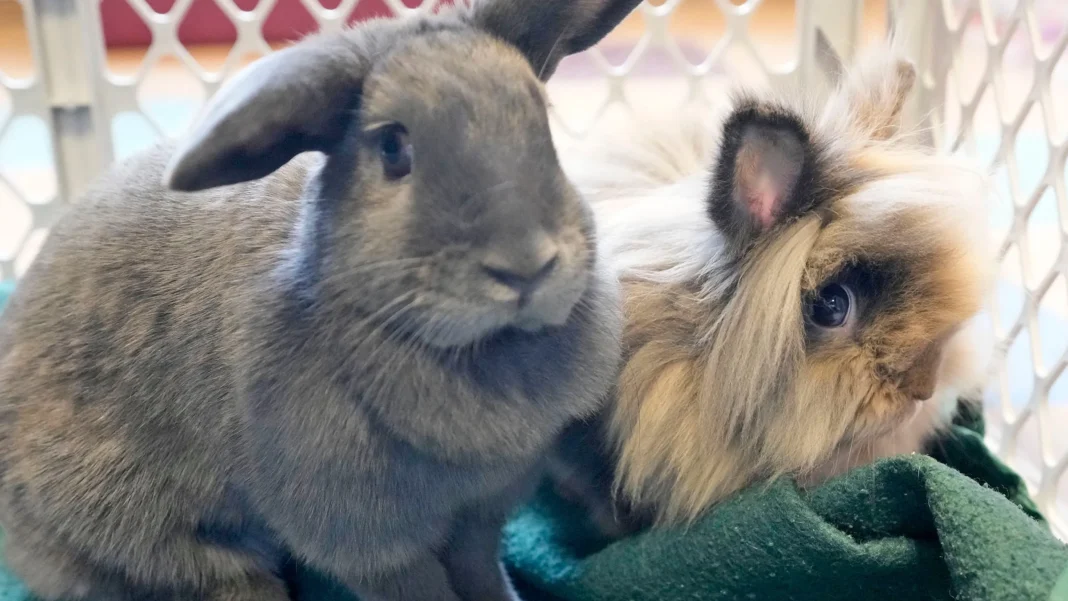
Key Takeaways:
Have you ever gazed into your fluffy bunny’s eyes and wondered about the secret world they inhabit? Those twitching noses and floppy ears hide a fascinating journey through life that many pet owners never fully grasp. Prepare to be amazed as we hop into the captivating realm of pet rabbits, uncovering the surprising twists and turns of their lifespan and the distinct stages that shape their existence.
The Surprising Longevity of Pet Rabbits

When it comes to pet rabbit lifespans, many people are caught off guard. These adorable creatures aren’t just short-term companions; with proper care, they can be furry friends for a significant portion of your life. On average, domesticated rabbits live between 8 to 12 years, though some may even surpass this range with exceptional care.
This longevity means that bringing a bunny into your home is a substantial commitment. It’s not uncommon for rabbits to outlive other popular small pets like hamsters or guinea pigs. Understanding this timeframe is crucial for potential rabbit owners to ensure they’re prepared for the long-term responsibility and joy that comes with rabbit companionship.
From Kit to Elder: The Stages of a Rabbit’s Life
Just like humans, rabbits go through distinct life stages, each with its own set of characteristics and needs. Let’s explore these phases to better understand the journey of our hopping friends.
Newborn to Weaning (0-8 weeks)
The first stage of a rabbit’s life is incredibly delicate. Newborn rabbits, called kits, are born blind and hairless. They rely entirely on their mother for warmth and nutrition. During this period, kits grow rapidly, developing fur and opening their eyes around 10 days old. By 3-4 weeks, they start exploring outside the nest and nibbling on solid foods. Weaning typically occurs around 6-8 weeks of age.
Juvenile (8 weeks – 6 months)
After weaning, young rabbits enter a period of rapid growth and development. This is when their personalities really start to shine through. They become more active, curious, and playful. It’s during this stage that socialization is crucial, helping to shape them into well-adjusted adult rabbits. Their dietary needs are high, requiring a balance of hay, pellets, and fresh vegetables to support their growing bodies.
Adolescence (6 months – 1 year)
Rabbit adolescence brings about significant hormonal changes. This is when rabbits reach sexual maturity, typically between 4-6 months for small breeds and 5-8 months for larger breeds. During this time, rabbits may become territorial or exhibit behavioral changes. It’s often recommended to spay or neuter rabbits at this stage to prevent unwanted litters and reduce certain health risks.
Adulthood (1-5 years)
The adult stage is the longest period in a rabbit’s life. During these years, rabbits settle into their personalities and routines. They’re at their physical peak, full of energy and curiosity. Adult rabbits require a consistent diet, regular exercise, and mental stimulation to stay healthy and happy. This is often the most rewarding time for rabbit owners, as the bond between pet and human deepens.
Middle Age (5-7 years)
As rabbits enter middle age, they may start to slow down a bit. Their energy levels might decrease, and they may become more content with quieter activities. It’s important to monitor their weight and adjust their diet accordingly, as middle-aged rabbits can be prone to obesity. Regular vet check-ups become even more crucial to catch any age-related issues early.
Senior Years (7+ years)
Senior rabbits require special attention and care. They may develop age-related conditions such as arthritis or dental problems. Their dietary needs often change, sometimes requiring softer foods or supplements. Despite slowing down physically, many senior rabbits maintain their loving personalities and continue to be wonderful companions. With proper care, senior rabbits can still enjoy a high quality of life in their golden years.
Factors Influencing a Rabbit’s Lifespan
Several key factors play a role in determining how long a pet rabbit will live:
Genetics and Breed
Just like with dogs, a rabbit’s breed can influence its lifespan. Generally, smaller breeds tend to live longer than larger breeds. For example, dwarf breeds often live 10-12 years, while giant breeds might live 5-7 years. Mixed-breed rabbits often benefit from hybrid vigor, potentially leading to longer lifespans.
Diet and Nutrition
A balanced diet is crucial for a rabbit’s longevity. The cornerstone of a healthy rabbit diet is unlimited high-quality hay, supplemented with a measured amount of pellets and fresh vegetables. Proper nutrition supports digestive health, prevents obesity, and ensures rabbits receive all necessary vitamins and minerals.
Exercise and Environment
Rabbits need ample space to hop, run, and play. Regular exercise keeps them physically fit and mentally stimulated. A safe, stress-free environment with plenty of enrichment activities can significantly contribute to a longer, happier life.
Healthcare
Regular veterinary check-ups, prompt treatment of illnesses, and preventive care are essential. Spaying or neutering not only prevents unwanted litters but also reduces the risk of certain cancers, potentially extending a rabbit’s lifespan.
Enhancing Your Rabbit’s Quality of Life
Understanding the lifespan and stages of a rabbit’s life allows owners to provide tailored care at each phase. Here are some tips to ensure your bunny lives its best life:
- Provide a varied diet rich in hay, fresh vegetables, and limited pellets
- Ensure plenty of exercise and playtime outside the cage
- Offer mental stimulation through toys and interaction
- Keep living areas clean and safe
- Schedule regular vet check-ups, especially as your rabbit ages
- Show love and affection daily – rabbits are social creatures!
By considering these factors and providing attentive care, you can help your furry friend live a long, healthy, and joyful life. The secret lives of bunnies are filled with more depth and longevity than many realize, making them truly remarkable companions for those willing to invest in their well-being.
Conclusion
Unveiling the secret lives of bunnies reveals a rich tapestry of growth, change, and longevity that many pet owners might not expect. From the tiny, vulnerable kits to the wise, gentle seniors, rabbits offer companionship and joy throughout their surprisingly long lives. By understanding the distinct stages of a rabbit’s life and the factors that influence their lifespan, we can provide better care and forge deeper connections with these delightful creatures. Whether you’re a seasoned rabbit owner or considering bringing a bunny into your home, embracing the full journey of a rabbit’s life can lead to a rewarding and enriching experience for both pet and owner alike.
Frequently Asked Questions
Source: baledog.com


